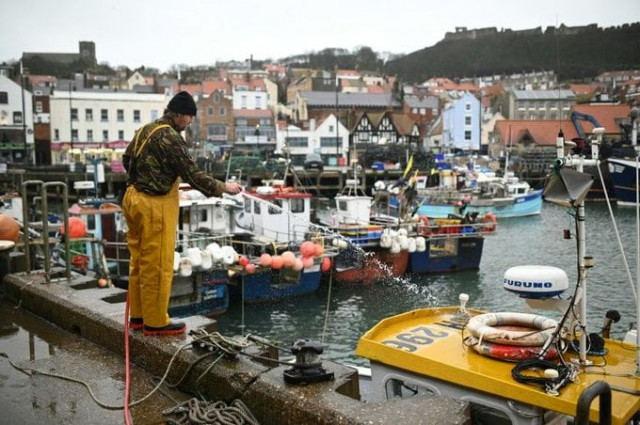English fishing boats forced to remain in port during virus border closures
If the gridlock continues into next month then the implications could be significantly worse

Fishing boats in the north of England were forced to remain in port on Monday because of the disruption to supply chains caused by French border closures following the discovery of a new coronavirus variant in the UK.
Matthew Barnes, a fisherman who catches scallops off the port of Scarborough, told AFP that being prevented from going out to sea for the second time this year could potentially spell calamity for the sector.
"When Covid first struck we had exactly the same thing, we had to stop fishing for over a month, which was a financial disaster," he explained.
Barnes, who might expect to bring in a catch of three tonnes, and others like him, have been prevented from fishing at the close of the normally prosperous Christmas season because they cannot sell their shellfish to processing plants that ship on their produce to Europe.
"We had to stop fishing because they can't shift our product," the 33-year-old who began fishing at the age of 10 and whose father was also a fisherman explained.
Following the discovery of a new, more transmissible variant of the coronavirus, dozens of countries have suspended travel from the UK.
On Sunday, France made a snap decision to shut its borders to UK hauliers for 48 hours in a bid to contain the spread of the virus, disrupting supply chains particularly through the key port of Dover on which Britain is reliant.
The blockage of trade across the Channel has had an acute knock-on effect on seafood exporters that have been prevented from shipping their perishable produce to the continent, where it is in particular demand during the festive season.
'Disaster' for crews
Barnes said the immediate impact on his bottom line could be limited. Monday would have been his last day of fishing before the start of a winter break lasting till January.
However, if the gridlock at Britain's ports and the disruption to the supply chain continues into next month then the implications could be significantly worse.
"I just hope it can be resolved in the two weeks," he said, explaining regretted the uncertainty caused by the pandemic, which has caused a fall in prices and may continue at the end of the fast-approaching Brexit transition period.
"The Christmas and New Year market is always a huge market for the entire UK seafood sector but the prices and demand just go through the roof. This year it just hasn't."
Britain and the European Union are engaged in the final stages of fraught negotiations to reach a trade agreement before the deadline of December 31 when the UK will exit the single market and the customs union.
Few issues in the discussions have been more difficult to finalise than fishing rights and access to British territorial waters.
According to Seafish, the British association representing the seafood industry, exports to France for human consumption reached 7,417 tons in December 2019, a value of £63 million ($85 million, 68 million euros).
"Europe is an important market for some of our high value UK seafood, including shellfish which is exported live and highly perishable," Aoife Martin, Seafish's Operations Director said.
"We know many seafood businesses are affected, particularly in Scotland."
The Scottish Seafood Association called on the government to compensate its members "who will lose millions of pounds" because of the closure of the French border.
Jimmy Buchan, the association’s managing director said on Twitter that the losses were a "disaster" for companies that had already been hit hard by the first wave of the pandemic in March.
Sam Crowe, a crab fisherman in Scarborough, also reluctantly gave up on a lucrative Monday fishing trip.
"I've got not much money in our bank to live on. We were expecting a good Christmas trip which could have brought us a bit of good money. Obviously that has all stopped," he said.
The 26-year-old explained his income was dependant on the export market. "No way on earth is the English population going to able to eat, nevermind buy, what we catch. It has to exported," he said.



















COMMENTS
Comments are moderated and generally will be posted if they are on-topic and not abusive.
For more information, please see our Comments FAQ